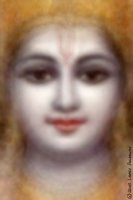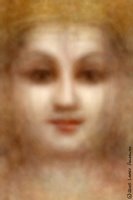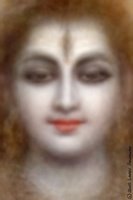


The divine pattern and potential matter, both of which derived are from GOD; who is the beginning, the middle and the end, are Brahma, Vishnu and Shiva.
God with creative ideas is Brahma, and who pours out his love and patience is Vishnu. When the conceptual becomes cosmic, God is represented by Shiva. Brahma, Vishnu and Shiva are fundamentally one though conceived in a threefold manner.
Vishnu is the internal controller who pervades the whole universe. He gathers to himself in an ever increasing measure, the position and dignity of external supreme. Krsna, the teacher of GITA, becomes identified with Vishnu, the ancient lord of the sun, and Narayana, an ancient God of cosmic character and the goal.
The real is the supracosmic, eternal, space less Brahman who supports this cosmic manifestation in space and time. He is the universal spirit, paramatman, who ensouls the cosmic forms and movements. He fills our being, illumines our understanding and sets in motion its hidden springs.
Though God controls it, he too has the element of negativity or Maya. He puts forth his active nature and controls the souls who work out their destinies along lines determined by their own natures. God is impersonal Absolute as well as the immanent will; He is uncaused cause, the unmoved mover. The boundless universe in an endless space and time rests in Him and not Him in it.
![]()








3 comments:
I just started reading the Sutras again. When I feel more settled, I will write you of my thoughts.
I just finished a book about Buddhaism. Obviously these are different faiths, but I like the discussion of mindfulness and the breath. What relationship do you see to the Gita in this, if any?
The concept of Brahman is similar to what Lao tzu calls Tao dna buddha calls dhamma. The creator, preserver and destroyer exist in us and Brahman is possibly the point of intersection of all the three. 'Om tat sat' : I am it!
M.
I note that you do not delve deeply into aspect Shiva. I must confess a certain fondness for the Hindu god(s), they seem somehow more genuine in their elemental nature. Genuine as representations of the ideals of the human critters that thought them up, if nothing else. The Christian god seems like a lofty syncophant to me, whereas Brahman, Vishnu, and Shiva seem to create a ripple effect as the stories have them move through the world.
I will not comment here often, as I recognize and respect the depth of your belief and the meaning you attach and find in this pattern of thinking. I only challenge those that invite challenge, and try not to purturb those that do not. I find your blog educational, and will read it often.
One last comment before I go: I find the nurturing of that which you label spiritual inside one's self to be a noble purpose. If I understand correctly, you believe that what the Christians call divine is as much inside one's self as outside. While I find the dichotomy to be something akin to double-think, the only difficulty I have is in understanding why this needs must be defined as something that exists apart from one's self, or as part of a greater whole.
"The most difficult thing in this world is to win against yourself! How does one go about it?"
I know what you mean, in that I struggle with self-defeating or self-destructive tendencies as do most humans, I think. Part of the answer might lie in breaking down the very construct. To win against one's self implies, or actually states, a division against one's self. Perhaps the secret is to embrace those unloved qualities and stop warring against them. Most religions turn this into a black-and-white style proposition, implying that this means immersing one's self in the less desireable aspects of human nature. I suggest not a surrender, but a truce. To war against one's self is to feel threatened by one's self.
Post a Comment